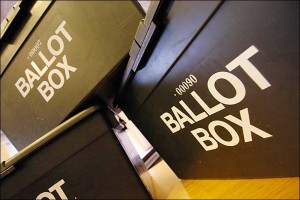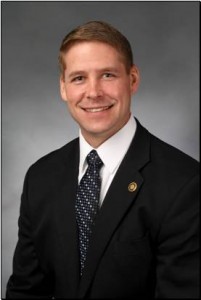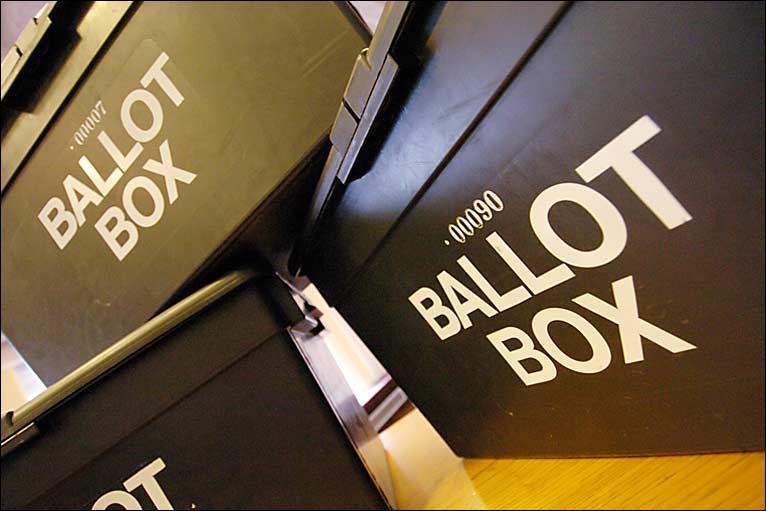by Collin Reischman
Jefferson City, MO — The Senate Committee on Financial and Governmental Organizations and Elections is well on its way to affecting elections in the state of Missouri and enhancing the power of Missouri State Auditor Thomas Schweich.
Military Voters
Senator Will Kraus, who sits on the committee, is proposing legislation changing elections. His bill, SB 116, establishes a uniform policy for provisional and absentee ballots for all uniformed military personnel voting in all federal, statewide and state legislative elections. Kraus’ legislation, originally intended for military personnel, was expanded to include all overseas absentee voters. The bill compels the Secretary of State of Missouri to “establish an electronic transmission system through which a covered voter may apply and receive voter registration materials and military-overseas ballots”
Kraus, a former member of the U.S. Army and current reservist, voted in 2003 and 2004 from his deployment positions in Iraq. Kraus began his testimony by explaining the long and difficult process required of overseas military personnel wishing to vote. Kraus said simply requesting a ballot involved printing and filling out a form to be mailed back to the U.S., which can take weeks or even months. By the time the ballot is received overseas and sent back to the U.S., many of them are too late to be tabulated, according to Kraus.
“If troops move, the ballot might not reach him,” Kraus said. “And, once you get the ballot, you fill it out and send it back, going back through the very long process of mailing it in. I just think it’s important that those fighting for our freedom overseas should be assured that their right to vote is protected and their vote is counted.”
 Senator Wayne Wallingford, R-27, a veteran of the U.S. Air Force, said he applauded Kraus’ bill and that he doubted his ballots were ever counted during his 9 years overseas.
Senator Wayne Wallingford, R-27, a veteran of the U.S. Air Force, said he applauded Kraus’ bill and that he doubted his ballots were ever counted during his 9 years overseas.
“I appreciate this so much,” Wallingford said. “The system takes a lot of time, which enlisted men don’t always have. I don’t think my ballots ever made it back in time.”
There was no major opposition to Kraus’ legislation, and the Missouri Secretary of State Policy Director, John Scott, testified that the language designed to include all overseas voters, not just those in the military, encouraged the SOS.
“We just got the substitute version which broadened the language,” Scott testified. “But from what we’ve seen, we think this is a good idea and we look forward to trying to implement it.” Scott indicated that technological advancements in the SOS office to establish and electronic system is estimated at $250,000.
Enhancing the Auditor
Senator Bob Dixon, R-30, proposed legislation enhancing the power of the Statue Auditor’s office. Dixon told the committee during testimony that several provisions of the law governing the auditor’s office were “out of date.”
“Some of these responsibilities and duties of the auditor haven’t been changed in 50 years,” Dixon said. “We obviously need to update those provisions in order to better empower our auditor to effectively deal with waste, fraud and abuse by government.”
The bill broadens the definition of the term “audit,” and allows the Missouri State Auditor to initiate an audit on his own volition, rather than abiding by a pre-determined schedule of audits for various bodies and organizations. Currently, many audits done in the state are done by request or by a schedule. New language would permit the auditor’s office to conduct such audits without advanced notice to the subjects of the audit. It also adds language requiring the state treasury to be audited “at least annually.”
While there was no opposition to the bill in testimony, some committee members indicated tentative concerns about the widening of the auditors power. Senator Paul LeVota, D-11, said the auditor conducting more “meaningful” audits encouraged him, but that the new power must be enshrined into law carefully.
“I just want to make sure this won’t allow some kind of partisan witch-hunt on the part of a state auditor in the future,” LeVota said. “So let’s try to be very careful about creating a situation where an auditor could exploit his office politically.”
Combining the Tickets
Senator John Lamping, R-24, is aiming to change the way the Governor and Lt. Governor are elected. A proposed change to the Missouri Constitution, SJR 4, would require that the Gov and Lt. Gov “shall be nominated and elected jointly,” beginning in 2016.
Lamping’s proposed constitutional amendment accompanies SB 54, which codifies the new requirements into law, should the amendment successfully pass the legislature and is approved by the voters in a ballot initiative during a general election. Lamping said the legislation was analogous to the Presidential election process, where the candidate nominated for the race for Governor would name his Lt. Gov upon receiving the nomination.
Lamping said it was important to have a more clear connection between the Lt. Gov and the Governor, and, more importantly, a stronger connection between the office of Governor and the legislature.
“I think there is some merit to combining these offices,” Lamping said. “It would also make more sense for the Governor to be empowered to name a replacement for the office of Lieutenant Governor if it is necessary, since it was the Governor who named the Lt. governor in the first place.”
Lamping told the committee during testimony that 25 states currently had laws similar to the one he was proposing, while 18 states have a process more similar to the current Missouri system.
Lamping also testified to SB 53, which would prohibit entities that invest in the energy sector in Iran from contracting with state or political subdivisions. Nancy Lisker, speaking on behalf of the American Jewish Community, called Iran a “terrorist supporting nation,” and a “grossly dangerous threat to the United States.” Lisker said it was time for Missouri to become one of the few states in the country to explicitly prohibit conducting business with Iran’s energy investors.
“We’ve seen what Hezbollah does with a suicide vest,” Lisker said. “Imagine what could happen if they had a nuclear weapon.” If passed, Missouri would be only the 4th state to explicitly prohibit business with entities investing in Iranian energy.
Moving the Primary to June
Lamping also testified about SB 79, which would move the primary election date in Missouri from August to June. The bill, which has been proposed but never passed in previous sessions, would lengthen the time period of the general election while shortening the primary season.
“This will give the primary winners a longer period of time to be heard, to consolidate their message and give people a more fully educated decision,” Lamping told the committee.
While some committee members raised concerns about whether or not candidates could effectively raise money and campaign in the shorter time period, Lamping did not share those concerns, and did not believe the voters would, either. Senator Joseph Keavney, D-4, said he didn’t believe the bill provided adequate time to prepare for a primary.
“I personally don’t raise any money during session,” Keavney said. “So you’re basically giving me 3 weeks to raise money for a primary, I’m just wondering if that is the best thing.”
Lamping refuted the assumption that it would damage the primary process.
“I think whether or not we can raise enough money to run against someone is extremely secondary to the voters in the state,” Lamping said. “I’m happy to say this in a public setting, I just don’t think the voters care whether or not we feel we can raise enough money.”
Some, like Kraus, raised concerns about voter fatigue in extending the election cycle.
“Do you worry at all about voters just getting sick of the campaign if we make it this long?” Kraus said. “Every voter I talk to says they are just sick of it by August or September, don’t you this could exacerbate that?”
Lamping, who is typically a sharp witness, countered quickly.
“I don’t disagree about the level of frustration, but I think voter frustration depends in large part on the candidates,” Lamping said. “I also think it would be wise to allow us to campaign and get our message out there before the election cycle for statewide offices or President tire them out in the late summer.”
Lamping said whether the candidates found the process easy was of “little concern to the public.”
Voter ID
Before adjournment, the committee successfully passed SJR 6 and SB 27. SJR 6 proposes a constitutional amendment to require photo ID’s for anyone wishing to vote and SB 27 codifies the new requirements into law, should the public pass the measure in a general election. The measure passed by a vote of 7-3 along party lines.
The vote puts all eyes on the House, as they will be voter-ID bill on the floor on Wednesday, February 13. Should the measure pass it will go to the conference committee, where successful passage would send it to the desk of the Governor and place the measure on the ballot for the next regularly scheduled general election.
Collin Reischman was the Managing Editor for The Missouri Times, and a graduate of Webster University with a Bachelor of Arts in Journalism.



